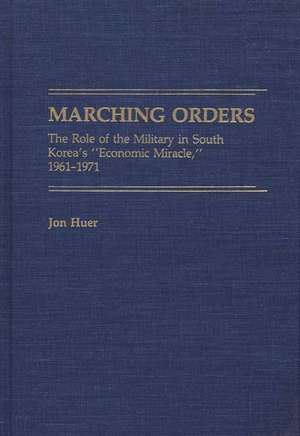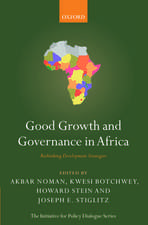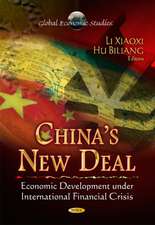Marching Orders: The Role of the Military in South Korea's Economic Miracle, 1961-1971: Bibliographies and Indexes in Mass Media and Communications, cartea 92
Autor Jon Hueren Limba Engleză Hardback – 30 iun 1989
This modern day rags-to-riches story tells how one of the poorest nations in the world evolved into one of the most technologically advanced. How did South Korea do it? The miracle' that occurred in South Korea was produced, in essence, by military men, many of whom had undergone extensive managerial training in the United States in the preceding decade, who gave marching orders' to a responsive populace. "Marching Orders," a historically factual, yet fast-paced and dramatic page turner, ' chronicles, in five parts, the history and events that led to General Park Chung Hee's 1961 coup d'etat and the transformations in Korean society that followed it during the next decade. Part One surveys Korea prior to 1961--a deprived colony during the Japanese occupation, then a war-devastated, barely industrialized nation whose existence depended heavily on U.S. economic aid. Part Two analyzes the military establishment--a crucial factor in Korea's economic prosperity even today. The military takeover of 1961 and the subsequent establishment of the Supreme Council for National Reconstruction (SCNR) were the turning points for this politically and economically bankrupt nation. These events led to the massive changes which are detailed in Parts Three and Four along with the rationalization' of the political sphere and the various aspects of economic rationalization, ' including the now-famous New Village Movement, a model of agricultural development for other emerging nations. In Part Five, the role and potential of the military in national development are explained and South Korea is presented as a success story. Indeed, Marching Orders could well serve as a How To' book for emerging countries.
Highly readable, "Marching Orders" has been written for the generalist without sacrificing scholarship. It will also prove useful to specialists in sociology, political science, economics, and Southeast Asia; to entrepreneurs engaged in trade with South Korea; and to those interested in Third World Development. An excellent addition to the reading lists of courses in development, comparative history, and military-civil cooperation.
Preț: 437.67 lei
Preț vechi: 707.69 lei
-38% Nou
83.75€ • 89.56$ • 69.83£
Carte tipărită la comandă
Livrare economică 17 aprilie-01 mai
Specificații
ISBN-10: 0313266484
Pagini: 235
Dimensiuni: 156 x 234 x 14 mm
Greutate: 0.51 kg
Editura: Greenwood Press
Seria Bibliographies and Indexes in Mass Media and Communications
Descriere
Highly readable, Marching OrderS≪/i> has been written for the generalist without sacrificing scholarship. It will also prove useful to specialists in sociology, political science, economics, and Southeast Asia; to entrepreneurs engaged in trade with South Korea; and to those interested in Third World Development. An excellent addition to the reading lists of courses in development, comparative history, and military-civil cooperation.
Notă biografică
The author obtained his Ph.D. from UCLA in 1975 in sociology and is the author of 15 books of social criticism. After teaching social science for the last 25 years at the U.S. military bases around the world, he retired in 2019 and is currently living in Greenfield, Massachusetts, with his wife Terry. The Green Palmers Chronicle is the first of the "Michael Brown Trilogy," to be followed by Darwin's Progress and Tales from Vespucci.















